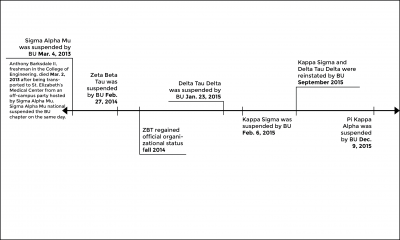
Boston University withdrew its recognition of the university’s chapter of Pi Kappa Alpha Dec. 9, 2015 for violation of the university’s “student organization policies,” according to PIKE International Fraternity spokesperson Brent Phillips.
The university is also currently investigating the Lambda Chi Alpha’s BU chapter following the BU Interfraternity Council’s suspension, Assistant Dean of Students John Battaglino said.
Administration is working with PIKE’s national chapter to bring PIKE at BU back as a healthy organization, Battaglino said, and will apply the same procedure to LCA if the ongoing investigation indicates a need to suspend the fraternity.
Battaglino was unable to comment on the cause of the fraternities’ current status, and it is unknown when the university will conclude its investigation on LCA.
“I would never comment about the details,” Battaglino said. “I don’t have the exact dates [of the investigation] in front of me.”
IFC Vice President of Programming Patrick Ayer declined to comment on PIKE’s suspension and the university’s investigation regarding LCA. According to Phillips, PIKE is also under suspension from the International Fraternity.
“During this administrative suspension, Lambda Nu Chapter must cease operations other than normal business meetings to discuss their current situation,” Phillips wrote in an email. “Chapter executive officers are developing a comprehensive action plan … to address operational deficiencies and restore the Chapter’s standing with the university and the Fraternity.”
BU PIKE President Giancarlo Roselli said the fraternity is complying with the terms of loss or recognition and is working on a plan to present to the university and the International Fraternity.
“The chapter appreciates the university’s willingness to review our proposed action plan and hopes to gain restoration of university recognition,” Roselli, a senior in the Questrom School of Business, wrote in an email.
While PIKE is currently suspended by BU, LCA’s standing is more ambiguous. Tad Lichtenauer, the spokesperson of LCA national, is unable to provide details on the founding chapter’s action until BU completes its investigation.
“Once the [BU] investigation is completed, based on the results and what the university may do, [we will determine] what we do to ensure that the chapter is meeting our standards of operation as well as the university requirements,” Lichtenauer said.
Carlos Gomez, LCA BU Chapter president and a senior in the College of Engineering, declined to comment.
Campus-wide conversations regarding BU’s fraternities’ misconduct have led several BU students to start openly discussing problems such as excessive partying and sexual assault.
Zoe Hawryluk, a freshman in the College of Communication, said she doesn’t attend fraternity parties because she has heard enough about them to make a judgment. Hawryluk then contrasted fraternities with the rush process of sororities at BU. Even so, she said she is glad to see the university paying more attention to fraternities.
“Monitoring and coming together as a community, understanding [a sense of] respect for yourself and other people is important,” she said.
James Graham, a freshman in the College of Arts and Sciences, said he is a member of Zeta Beta Tau and is now following the process of rushing new recruits.
“We have to really be careful about who we are letting into these fraternities,” Graham said. “That’s why we have this whole rush process. [Rushing is intended to] make sure we’re not letting in any kids who will take advantage of girls or who have the wrong idea of what being in a fraternity is all about.”
Rachel Woolf, a junior in CAS, said problems within Greek life directly correlate to pop culture. She said movies such as “The Hangover” are examples for what influences a lot of what’s happening amid college students nowadays.
“People want to escape or have fun, and they only think they can have fun if they’re incredibly out of it,” Woolf said. “The school has to settle a rule that maybe there can only be fraternities if they’re going to set up prevention [against sexual assault], or they’re going to talk to people who are rushing about it.”




















































































































